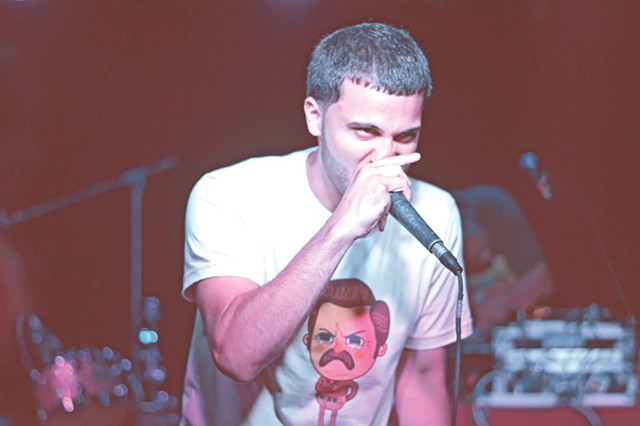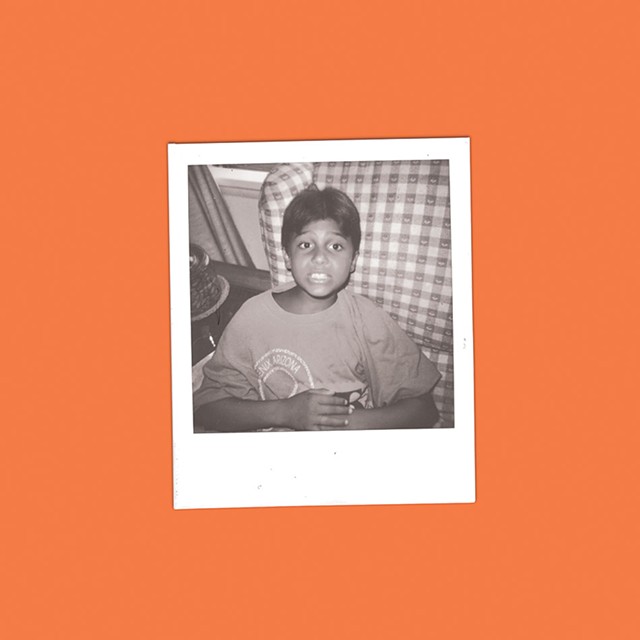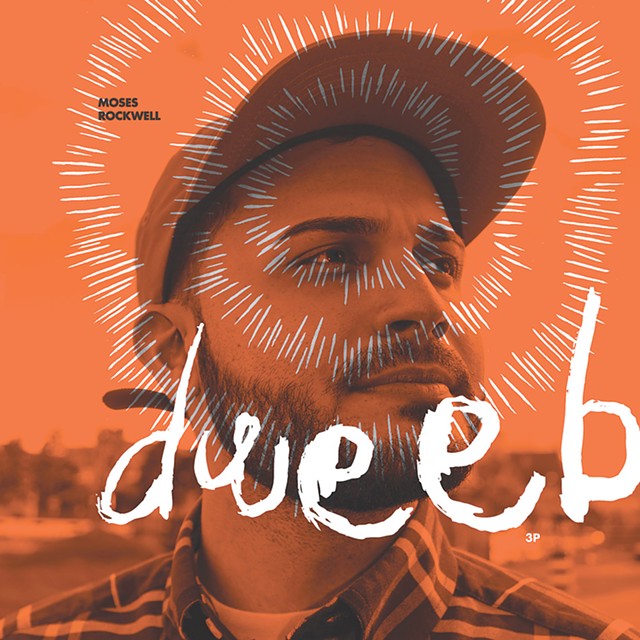Listening to Moses Rockwell sends the listener outside the hip-hop realm and into an exploratory state. His rapid fire rhythmic rhymes tumble off his tongue in a spree. At times, the words can evade you as they whiz by, which puts the voice into a more instrumental tone rather than a narrative one.
Even though the man has plenty to say, the effect is pretty cool; not necessarily just hearing what he says, but how he says it as well.
This lyrical-to-instrumental shift happened to Rockwell while touring Europe last year, hitting stops in Germany, France, and the Czech Republic with DJ Trumastr and Masai, an emcee out of Albany.
Sometimes language was an issue.
"They were cool, but it was weird," Rockwell says. "I didn't realize that the language barrier would interfere with my engaging with the crowd."

- PHOTO COURTESY ASHLEY ANNE
There wasn't a ton of energy in his more cerebral rhymes, but the verve was what the audience wanted according to Rockwell.
"If I'd known that, I would have brought more energy and less heady, intricate stuff," he says. "It worked some nights, but a lot of it was awkward; I got a lot of pity applause. Good food, though, holy shit, especially in Germany."
Rockwell knows audiences wanted the heat, they wanted the hooks.
"What they wanted are the spark words — like the word 'hip-hop,'" he says. "The call and response thing worked, but sometimes they were like, 'What?'"
Still most audiences knew the hassle of the overseas trip and appreciated him being there. It was a good learning experience, Rockwell says.
Over the last two years, Rockwell has released "Ahkwellington. Dweeb. Supreme. 1," and "Ahkwellington. Dweeb. Supreme. 2." "Ahkwellington. Dweeb. Supreme. 3" just dropped last week. And that's it. There probably won't be a number four in the series.
"I figured if I could do three albums," he says. "I'd have one good one. I think I'm done with three. Each one of them has its own subject matter. The first album is laid back and kind of groovy, the second one is real wonky and abstract, and the third is kind of a mixture of both."
There's an elephant in the room and you gotta ask Rockwell: "Coltrane, huh?" He doesn't flinch.
"Absolutely," he says, "but it's not really intentional."

- PHOTO COURTESY MITCH LAGROW
John Coltrane's 1965 recording of "A Love Supreme" — an exploration of God with its melding of the hard bop of the saxophonist's younger days with the free jazz of his later career — weighs heavy on Rockwell as an influence, big time. His smirk turns into a grin when he talks about it.
"That's my favorite piece of music ever, oh my God," he says. "I don't know why. I think maybe because it was my introduction to jazz. I think it's one of those things I'll never fully understand — not just sonically but what he was doing creatively. I hear something new every time I listen to it."

- COURTESY JUSTYN IANNUCCI & EVYN MORGAN
There's a bit-o-mystery in what Rockwell does as well ... even to the man, himself.
"I don't know, I think that's the whole point of the three "Dweeb" albums: just trying to figure it out. I don't really know who I am every day. My stuff recently has been self-indulgent, self-deprecating for the sake of comedy. Comedy is really important to me and I always try to put it in my music."
Rockwell manages a Walgreens. And he complains about this day job a lot.
"It's a thing that always pops up," he says. "Because it's really bad for your creative mind. It takes all the spunk out of you. They want you to be a robot, and I'm like, 'I need to be myself or I'm gonna lose it.'"
Rockwell is well-spoken but not outspoken. He has his mug set to permanent smirk yet he lacks the confidence to engage in socio-political issues. He's more of a reactionary. This is the antithesis to a good portion of hip-hop with its boasts and bold bravado.
"And when you ask what I've been up to / Don't expect shit you can fist pump to," he recites on the tune "I Don't Like You"(Hold Me Back)."

- COURTESY JUSTYN IANNUCCI & EVYN MORGAN
Rockwell says he probably feels and reacts to many of those social issues like most people do. "It needs to be talked about," he says, "we should be doing what we can to fix things, especially with a creative outlet to reach people. I try to do it a little bit here and there but it's not really the bulk of my stuff, and I'm discouraged when I try to articulate those kinds of things. I'm worried that I'll be out of my depth.
"But if I speak on it though, it'll just be more emotional than intellectual. Something happens today, you write about it tomorrow. There's definitely passion there; I'm just worried people don't want to hear my opinion. I think they just want to hear me make fun of myself, because that's my thing."
The fact that he doesn't feel qualified makes him qualified, even if it's in finding out who he is and what he does. Rockwell says it best on the track "Physique II": "It's not approval I'm seeking / I'm just trying to fight my demons."
"That's the whole theme behind the three albums," he says. "Just trying to figure my shit out. Then maybe I could have an opinion after that."
